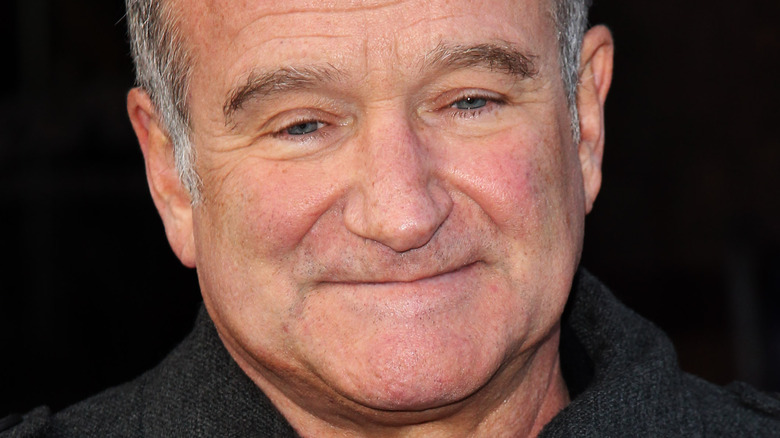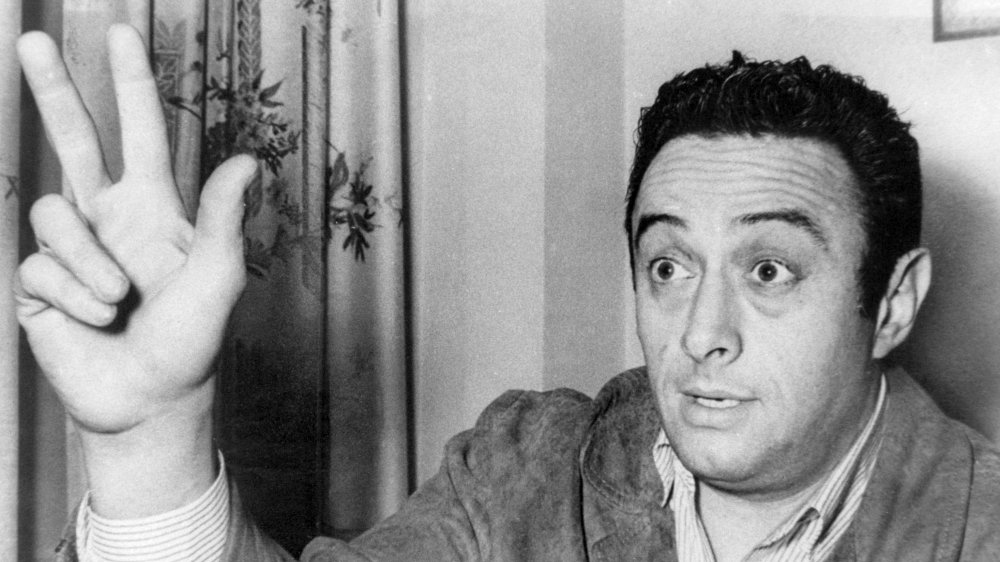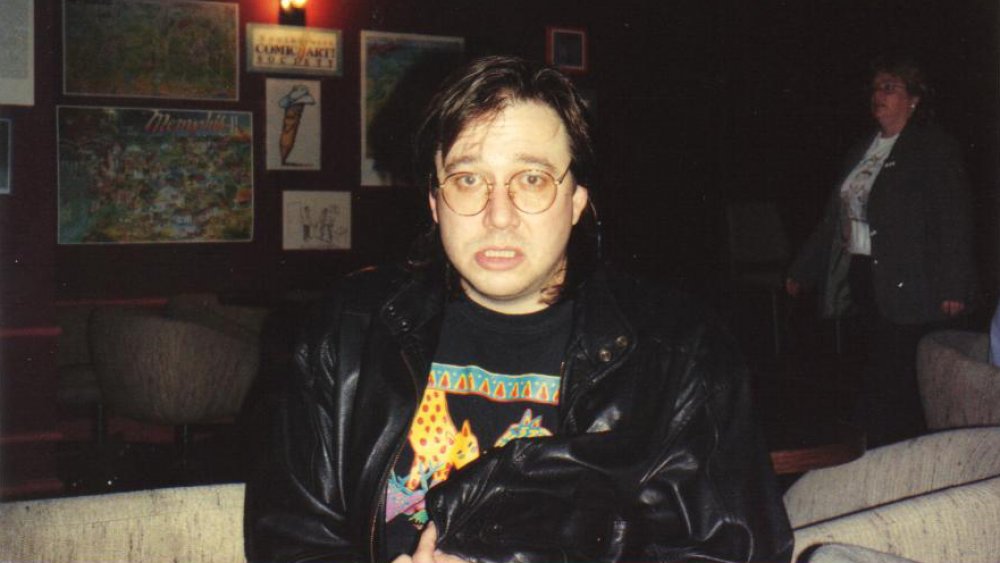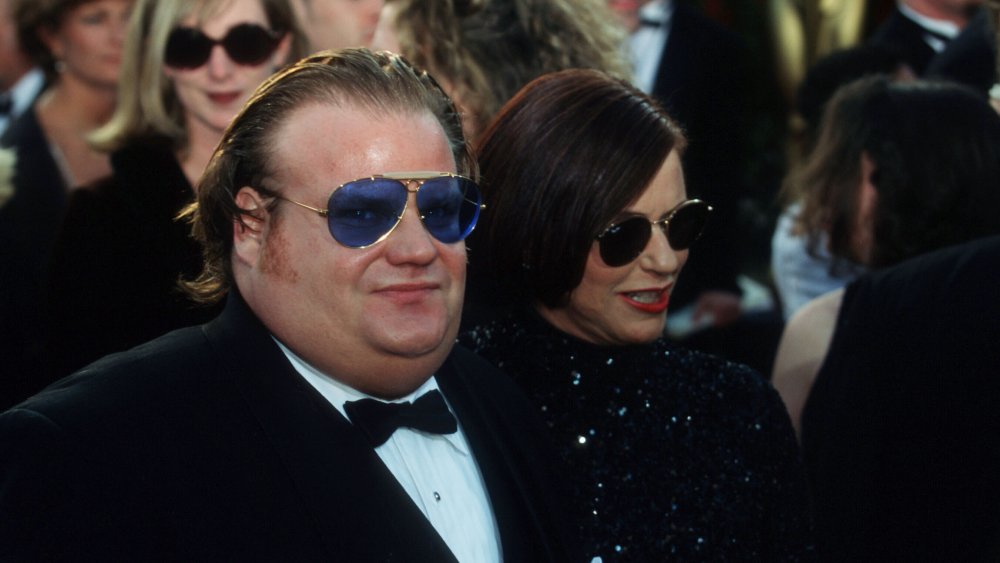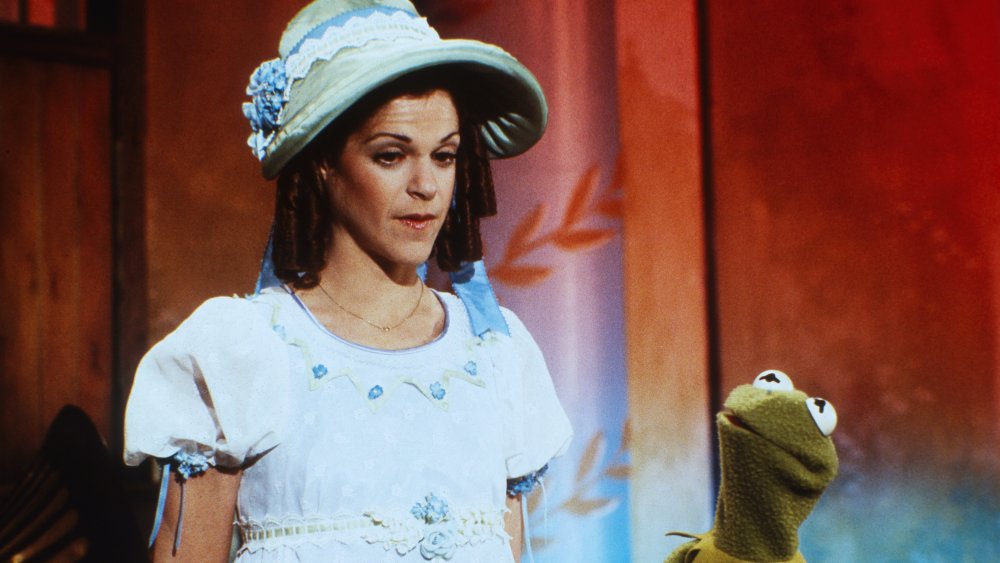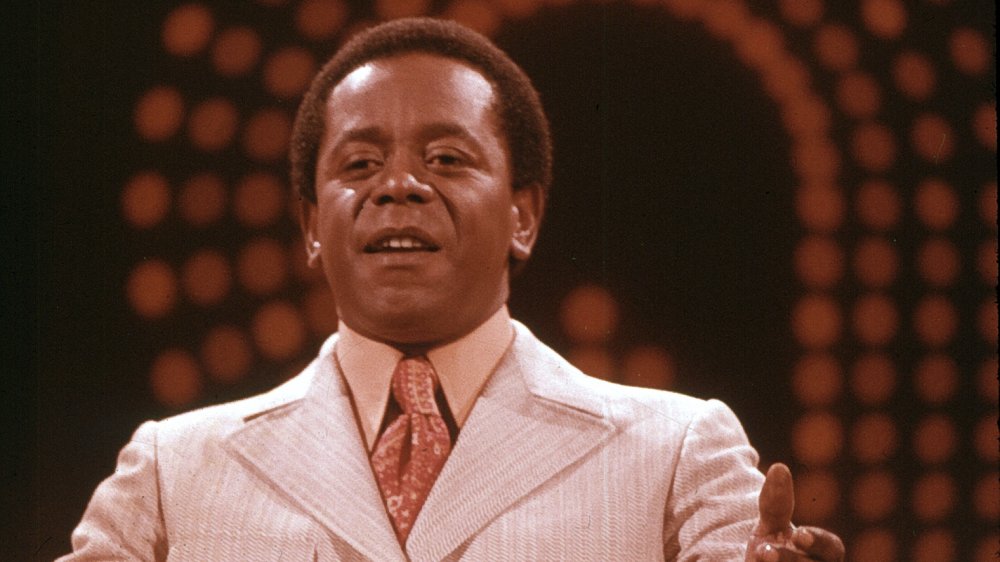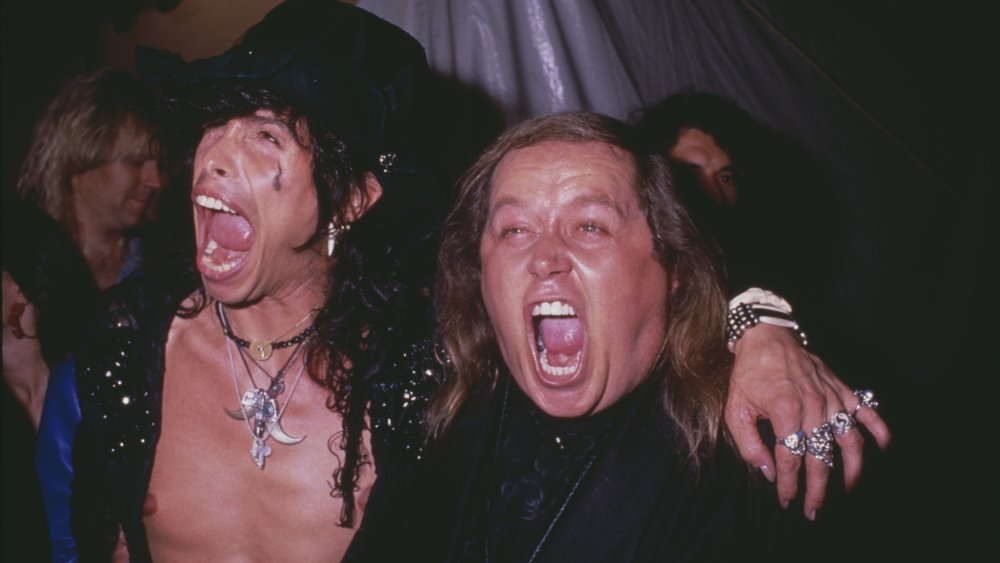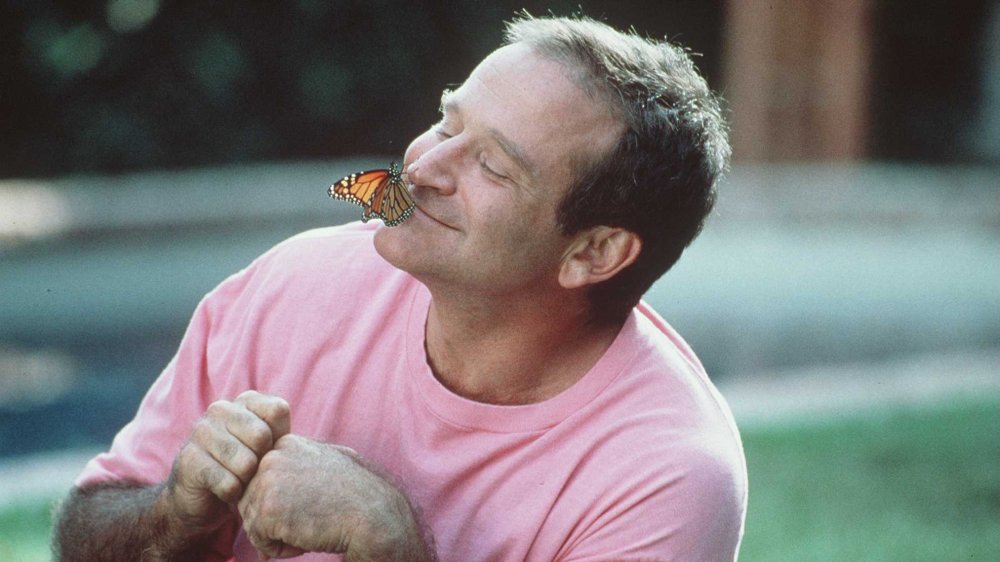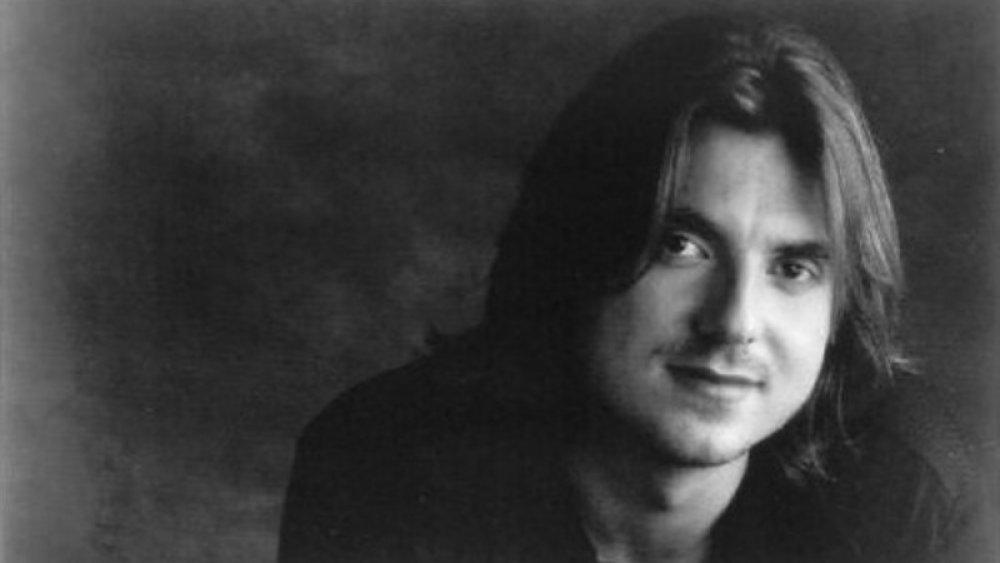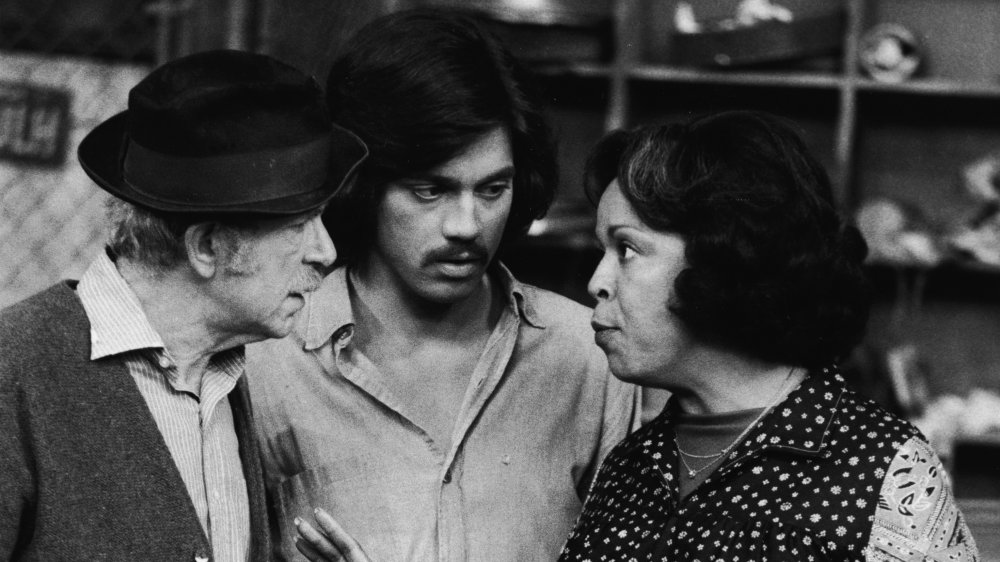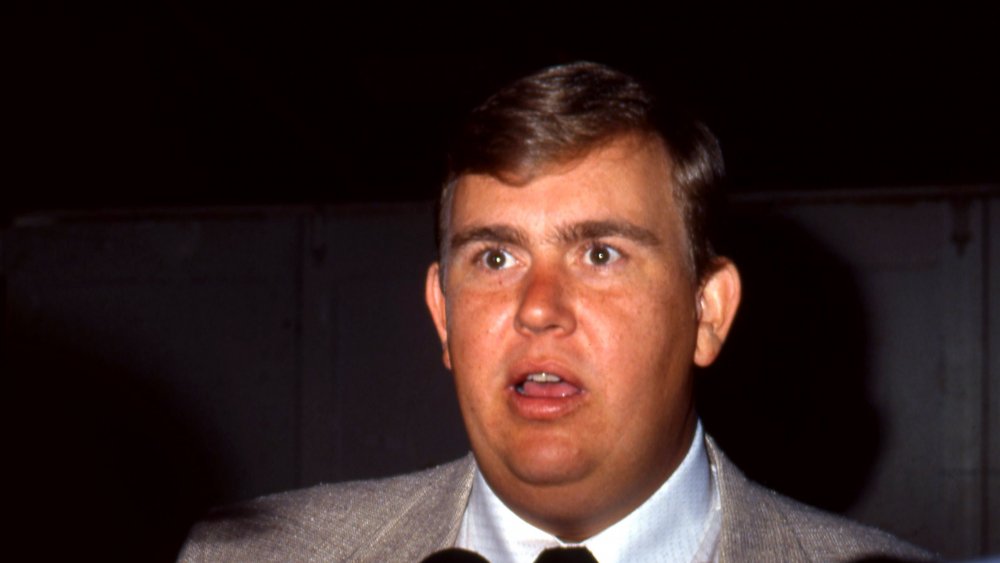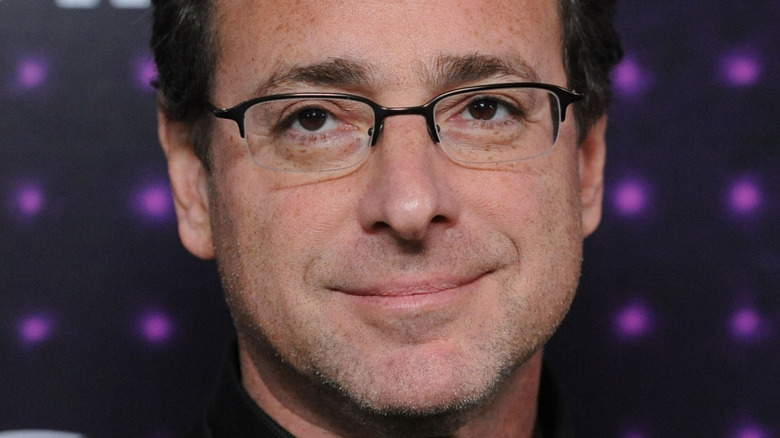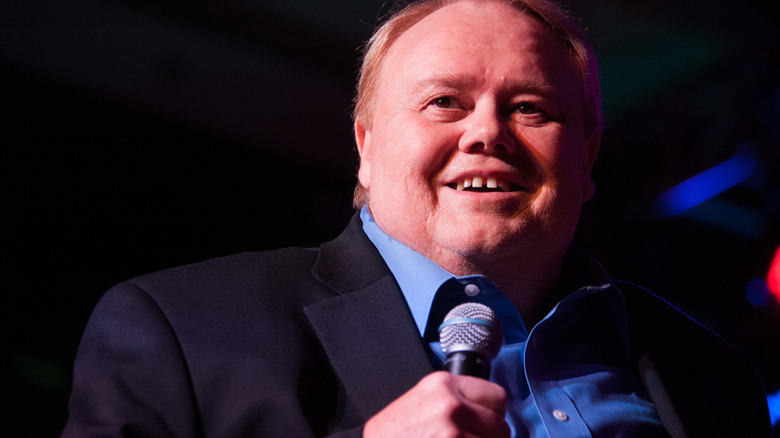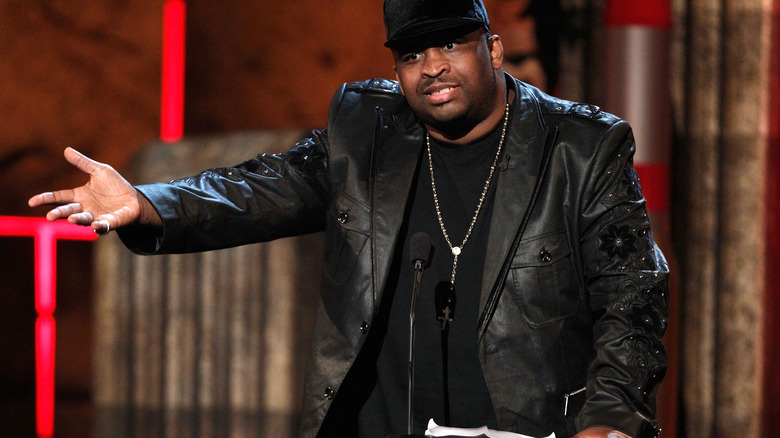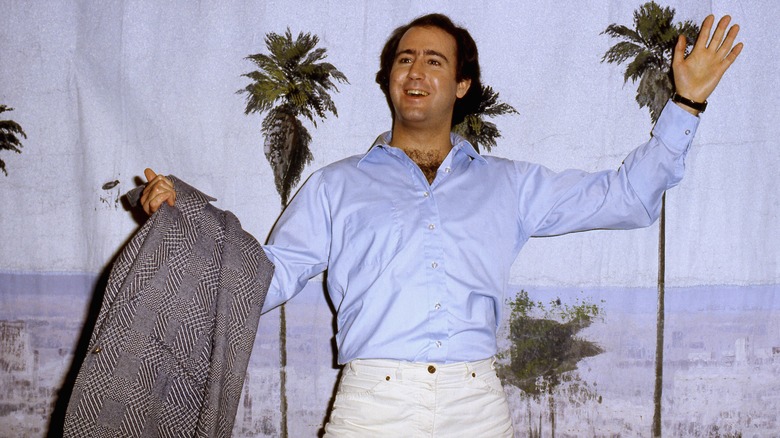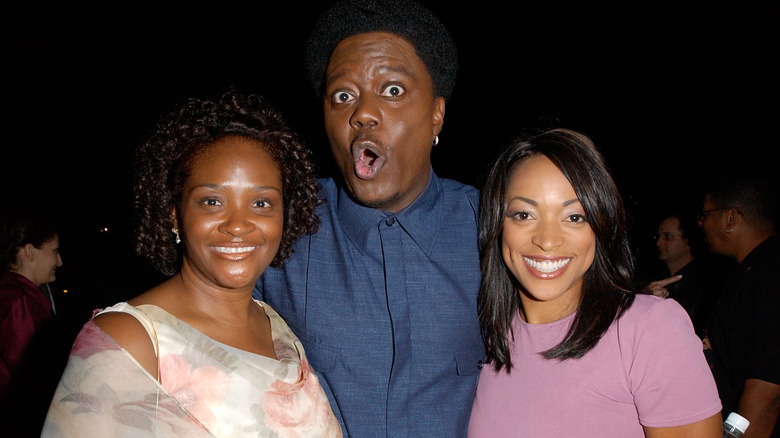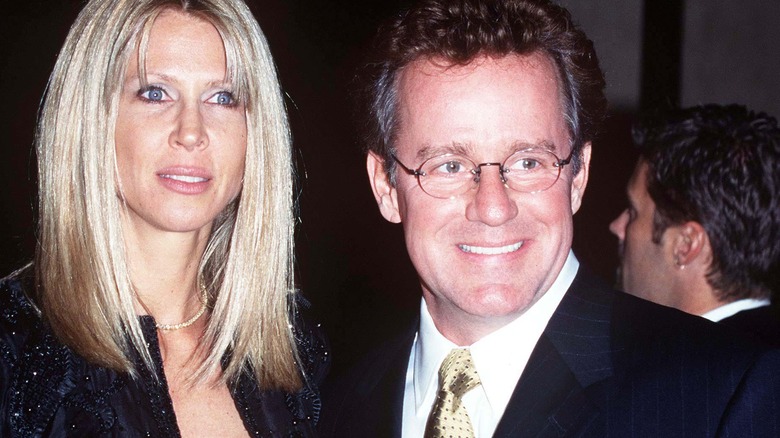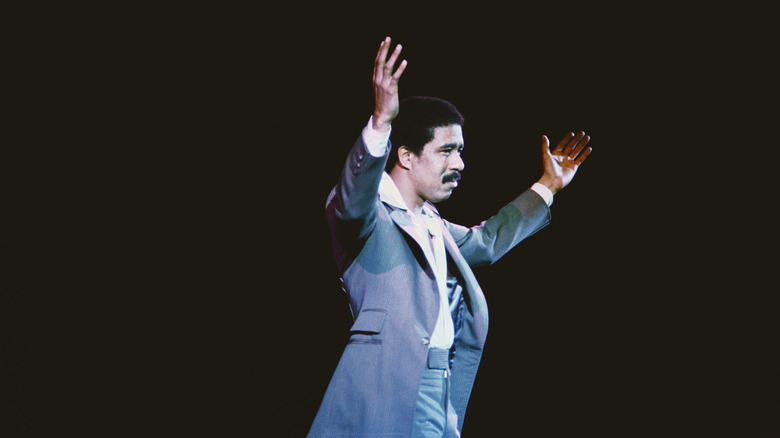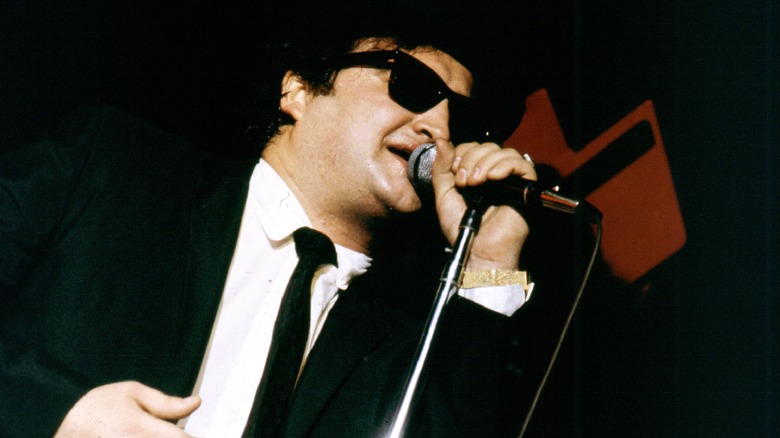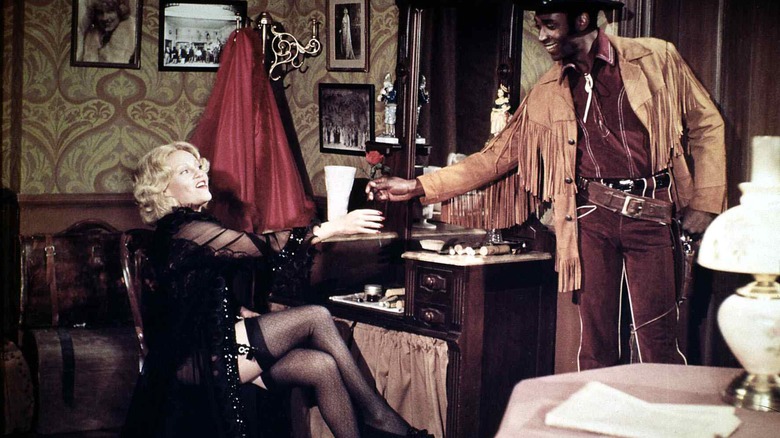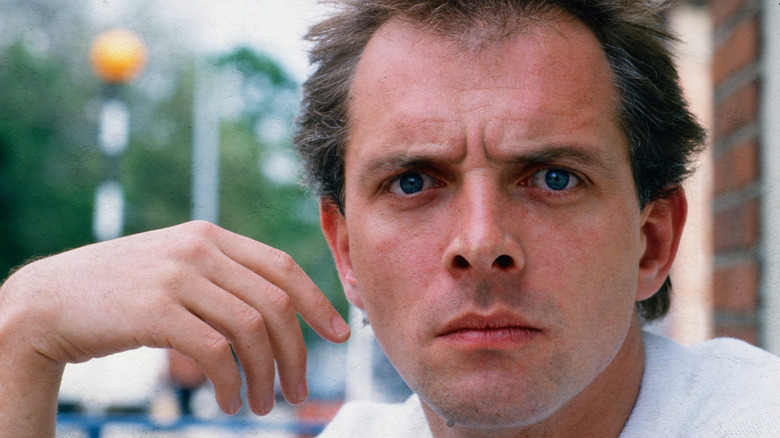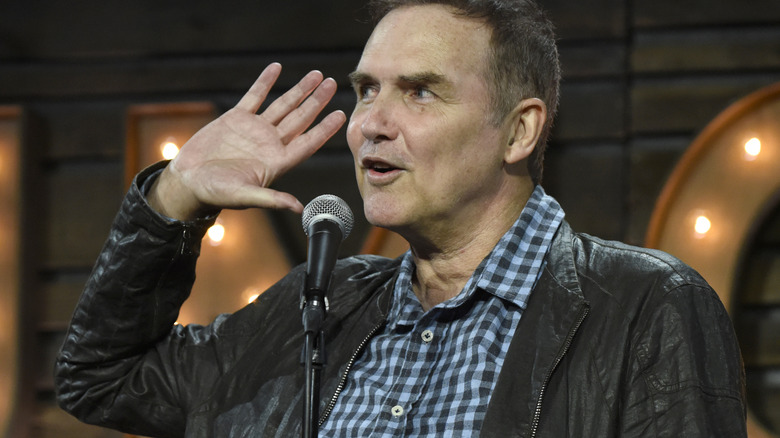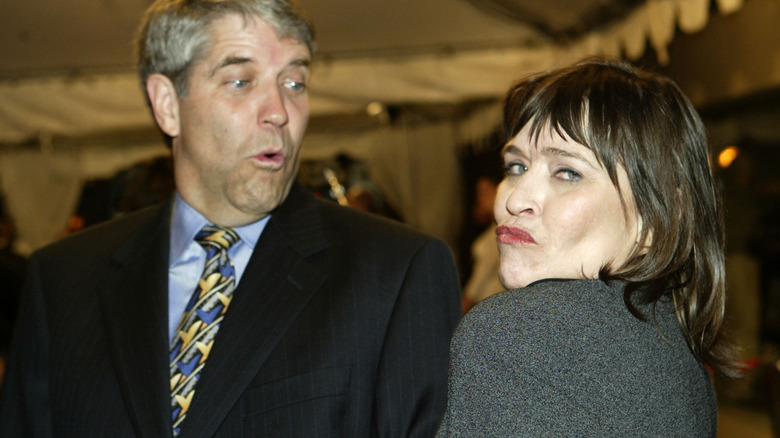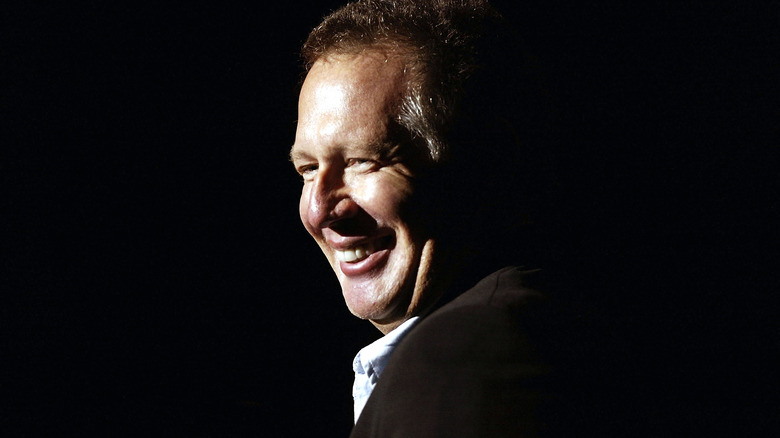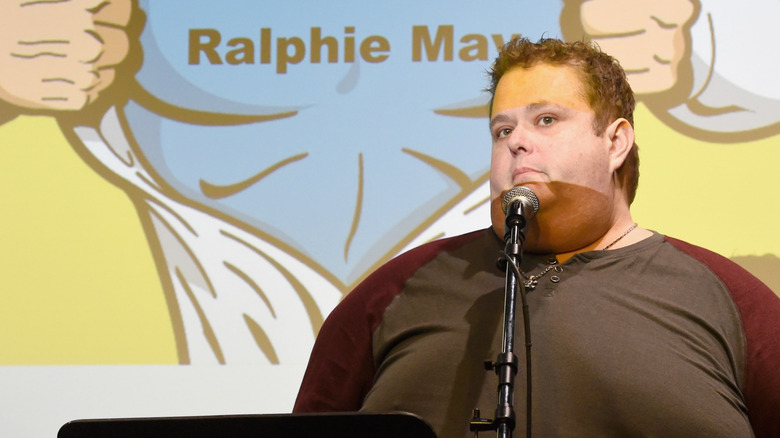Comedians Who Died Tragically
Pagliacci, the masterpiece opera composed by Ruggero Leoncavallo about a tormented clown, is a perfect mirror for the individuals on this list. The idea that comedy is derived from some sort of pain has been variously attributed to quotes by towering comedic figures such as Mark Twain, Lenny Bruce, and Steve Allen, according to The Critical Comic. Even something "lowbrow" like slapstick comedy, per Britannica, requires "absurd situations, and vigorous, usually violent action."
Pain seems to be necessary to produce a laugh from the audience, and comedians seemingly have to tap into pain, either internal or external, to become successful at their craft. Comedian Sarah Silverman said in a documentary titled Laughing Matters on the relationship between comedy and subjects like mental health and trauma, "Humor is how we all survive. I think a lot of people find humor in the darkest places." As with authors and musicians, this pain sometimes becomes too great for many comedians, and they turn to sex, drugs, or alcohol to numb themselves. In other cases, life treats them like any other person in terms of diseases or fatal incidents that they have no control over. Here are a few comedians who both made their audiences laugh and who passed away tragically.
Lenny Bruce
From Dustin Hoffman's Oscar-nominated portrayal of him in the 1974 biopic Lenny to his award-winning portrayal by Luke Kirby on the Amazon Prime show The Marvelous Mrs. Maisel, Lenny Bruce's life has been a point of interest for many people. Bruce became a counterculture icon in the late 1950s and 1960s, with his controversial comedic style and eventual arrests on "obscenity charges" throughout his career, most infamously after a 1964 show in New York.
As a comedian, Bruce combined social criticism and an edgy style with a colorful vocabulary and improvised style similar to that of a jazz musician. Bruce is ranked the third greatest comedian of all time by Rolling Stone, behind only George Carlin and Richard Pryor.
However, his style eventually led to his downfall. In 1961, he was arrested in San Francisco for "obscenity" following his act. The authorities would follow Bruce throughout his career afterward, making it harder and harder for him to earn a living and adding stress, coupled with his drug addiction. On March 31 and April 1, 1964, Bruce performed at the Café Au Go Go in New York, shows for which he was arrested and eventually convicted of violating obscenity laws in a highly publicized case, according to the Comic Book Legal Defense Fund. Thirty-seven years later, Bruce's conviction would be posthumously overturned. On August 3, 1966, Bruce died of a morphine overdose in Hollywood Hills, California.
Bill Hicks
In June 1993, Bill Hicks was diagnosed with pancreatic cancer. He died the following February at 32, leaving behind a massive comedic legacy. Much like Lenny Bruce in the 1950s and '60s, Hicks achieved cult status (in the United States at least) throughout his comedic career and has become more known and celebrated following his early death.
Hicks grew his audience and comedic style through relentless touring in the late 1980s and working in the Houston-based "Comedy Workshop" while a part of the Texas Outlaw Comics, a group of young comedians that famously included Sam Kinison. According to Britannica, Hicks did about 300 shows a year for a five-year period. He drew comparisons to the likes of George Carlin, Lenny Bruce, and Richard Pryor for tackling "taboo" subjects in society such as the First Amendment, advertisement, religion, and substance abuse. Britannica described his later comedy as "ontological," discussing human existence itself.
Like Lenny Bruce, these subjects limited his commercial viability in the United States outside of an intense cult following, though Hicks, unlike Bruce, saw great success overseas. Unfortunately, Hicks was diagnosed with pancreatic cancer and died from the disease within nine months. One of his last appearances was on the Late Show with David Letterman, a slot which became infamous for Letterman cutting the entire set to avoid controversy, enraging Hicks. In 2009, Letterman invited on Hicks' mother, Mary Hicks, to apologize and played the entire performance.
Chris Farley
Similar to how Kobe Bryant was seen as the heir to Michael Jordan, Chris Farley was seen as the next John Belushi when he appeared on Saturday Night Live. Belushi and Farley were robust men who could steal a sketch with seemingly endless energy. Unfortunately, Farley also carried the same demons that Belushi held — demons which ultimately ended both their lives.
Farley joined SNL in 1990, and during his five-year tenure on the show, he became one of its most celebrated actors. Rolling Stone ranked him as the No. 15 all-time SNL cast member. His sketches like the Chippendales audition and Matt Foley: Van Down By The River became some of the most memorable bits of any era. Following his time on the show, he starred with his SNL co-star David Spade on the films Tommy Boy and Black Sheep.
While Farley's career was on the rise, his personal life was marred with drug and alcohol addiction. Farley was eventually let go from SNL in 1995, though he returned two years later with hosting duties. The New Yorker reported in a 2015 piece that Farley "had lost his voice during a dress rehearsal, and was breathless throughout the live broadcast." Less than two months after hosting the show, Farley died of a cocaine and morphine overdose (known as a speedball) at the age of 33, the same age and the same combination of drugs that killed John Belushi in 1982.
Gilda Radner
As one of the original cast members on Saturday Night Live, Gilda Radner earned herself an Emmy award in 1978. The New York Times commented on her 1979 stage show Gilda Radner: Live From New York that "she combines the physical humor of Lucille Ball with the diverse characters of Lily Tomlin." Radner's influence can be seen in popular television characters such as Elaine Benes from Seinfeld and Liz Lemon from 30 Rock, per The Guardian.
It's not surprising that both actresses for these characters, Julia Louis-Dreyfus and Tina Fey, were themselves SNL alumni. After leaving the show, Gilda appeared in few movies throughout the 1980s, often ones that featured her eventual husband, comedian Gene Wilder. The two met on the set of 1982's Hanky Panky and married two years later.
In 1986, Radner started to suffer from a myriad of issues, such as cramping, bleeding, weight loss, and aching, to name a few. During this time, she and Wilder were attempting to have a child. Eventually, after visits to multiple doctors and a number of medications prescribed to her and misdiagnosis after misdiagnosis, Radner was diagnosed with ovarian cancer. According to Wilder, her reaction after months of doctors misdiagnosing her and questioning the severity of her ailments was, "Thank God, someone believes me!" Unfortunately, Radner would die in May 1989 at age 42 from the disease.
Flip Wilson
As the radical activism of the 1960s turned to the 1970s, Flip Wilson's popular comedy program, The Flip Wilson Show, illustrated how far the nation had come in terms of race relations. While Wilson was not the first African American to host his own television program, the popularity of his show led Time to refer to Wilson as "TV's First Black Superstar." His popular character of Geraldine, a sassy and unfettered Black woman, can be seen in other drag characters such as Jaime Foxx's Wanda and Martin Lawrence's Sheneneh Jenkins.
Wilson understood his role as a popular Black comedian palatable for a white audience."A show hosted by a black had never been accepted," he said. "I may have been the first black in the house." In this way, Wilson played the role of Joe Louis in boxing, staying clear of the political turbulence of his time in order to put a foot in the door for future Black comedians to be free to discuss anything.
By the 1980s, Wilson had left show business to focus on his family, though he would struggle with drug addiction during this period. He returned in 1985 to play the father in the CBS series Charlie & Co, which was considered an answer to NBC's The Cosby Show. It ran for only one season. Wilson would pass away from liver cancer at the age of 64 in 1998.
Sam Kinison
Sam Kinison began the 1980s as a former fire and brimstone Pentecostal preacher trying to make it as a comedian. He ended the '80s as one of the decade's most successful comedians, known for his routine that would have gotten him kicked out of every church in the nation.
Kinison was the angry man of comedy, known for his iconic scream and explicit rants about different subject matters. In the early 1980s, he was a part of the Texas Outlaw Comics, with Bill Hicks and others, where he refined his routine. Hicks said of Kinison, according to GQ, "What I learned from Sam was this. He was the first guy I ever saw to go on stage and not in any way ask the audience to like him. That gave me confidence because then I knew you could just be yourself."
On April 5, 1992, Kinison married his girlfriend Malika Souiri. Five days later, Kinison was traveling to Nevada for a show when he was struck head-on by a pickup truck. According to Final Words Project, Kinison carried on a conversation with seemingly no one just before he died. Kinison was pleading that he did not want to die, asked no one in particular why he had to die, and then seemingly accepted an answer, saying "Okay, okay, okay." Kinison died at the age of 38.
Robin Williams
Robin Williams became a star with characters such as the alien Mork in Mork and Mindy, voicing the Genie in Disney's Aladdin, and his more serious roles in films such as Dead Poets Society and his Academy Award-winning role in Good Will Hunting. Outside of the small and large stage, his comedy specials were filled with improvisation and characters he could break into, like a comedic Swiss army knife.
At the same time, Williams struggled throughout his career with depression and addiction to drugs and alcohol. The phrase "tears of a clown" fit Williams like a glove both on and off the stage. He kicked his cocaine habit following the death of friend John Belushi, who had been with Williams the night before his fatal overdose, though Williams struggled with alcohol and depression for the remainder of his life.
Months before his suicide, Williams was diagnosed with Parkinson's disease. Cheri Minns, Williams' makeup artist on one of his final films, Night at the Museum: Secret of the Tomb, said to Vanity Fair that Williams "wasn't in good shape" and "was sobbing in my arms at the end of every day." People close to him said he was losing weight, and it was becoming harder and harder to hide the effects of his condition. On August 11, 2014, Williams committed suicide. After his death and autopsy, it was discovered Williams actually had Lewy body dementia.
If you or anyone you know is having suicidal thoughts, please call the National Suicide Prevention Lifeline at 1-800-273-TALK (8255).
Mitch Hedberg
In a 2001 interview with Penthouse, Mitch Hedberg said when asked how he'd end his life: "First, I'd want to get famous, and then I'd overdose. If I overdosed at this stage in my career, I would be lucky if it made the back pages."
Mitch Hedberg's comedy was a bit of a throwback, as it relied more on clever puns and a quick wit, similar to that of Rodney Dangerfield or Jerry Seinfeld, the latter of whom he was compared to by Time. Entertainment Weekly referred to him as "comedy's Kurt Cobain." Much like the rock star, Hedberg seemed very uncomfortable with his popularity, many times mumbling his lines and keeping his head down and voice low. Also like Cobain, Hedberg was heavily addicted to drugs, an issue he fought throughout his life.
Hedberg developed a passionate cult following who would be able to shout his punchlines before he could finish the jokes he set up. Unfortunately, Hedberg was unable to overcome his drug dependency. On March 30, 2005, he was found dead in his hotel room from a heroin and cocaine overdose. Thirteen days prior, Hedberg appeared on The Howard Stern Show and said that he had his drug problem "under control." He was 37 years old. Marc Maron said about Hedberg's influence to Vice, "He's one of those guys that you'll hear in other comics. Just a hint of Mitch."
Freddie Prinze
Before he was out of his teens, Freddie Prinze was already a popular television and comedy star, and then he died at age 22. His career lasted less than five years, but he still left a large legacy with his show Chico and the Man, his appearances on celebrity roasts, and his stand-up.
In 1979, CBS made a television movie about Prinze's life titled Can You Hear the Laughter?: The Story of Freddie Prinze. Producer Peter Greenberg said of Prinze, "He never got a chance to think. He was moving too fast." By 16, Prinze was already using cocaine, and he took tons of Quaaludes, according to Entertainment Weekly. His big break came in 1973, when he had a great performance on The Tonight Show, leading to his sitcom-starring breakthrough the next year on Chico and the Man with co-star Jack Albertson.
By 1977, however, Prinze had become depressed and dependent on drugs. His marriage was crumbling, and he worried about being separated from his child. On January 28, 1977, while his manager Marvin Snyder was present, Prinze shot himself in the head and died the next day, per The New York Times. His death was originally declared a suicide, but Prinze's family launched a civil case, leading to his death being declared accidental because of the actor's hobby of playing Russian roulette, according to CBS News.
If you or anyone you know is having suicidal thoughts, please call the National Suicide Prevention Lifeline at 1-800-273-TALK (8255).
John Candy
With his roles in films such as Uncle Buck and Planes Trains, and Automobiles, John Candy became known for being a comedic star who played warm-hearted characters. This made his 1994 death from a heart attack even more painful, as people loved Candy's characters for both their humor and heart.
Candy spent the 1970s and 1980s acting in television (such as on the award-winning comedy program Second City Television) as well as playing minor characters on film, only obtaining lead roles in two critically panned movies, Summer Rental and Armed and Dangerous. 1987 would be Candy's breakout year in cinema, co-starring in Mel Brooks' Star Wars parody Spaceballs and the holiday classic Planes, Trains, and Automobiles with Steve Martin. The next seven years would see Candy star or co-star in a number of classic family comedies such as Uncle Buck, The Great Outdoors, and Cool Runnings.
On March 4, 1994, Candy died of a heart attack at 43 as he finished filming his penultimate movie Wagons East. Years later, REELZ released a docuseries, Autopsy: The Last Hours of..., which focused on the deaths of celebrities. According to the series' host, forensic pathologist Dr. Michael Hunter, career setbacks would drive Candy, who struggled with obesity throughout his life, to episodes of binge-eating. Dr. Hunter also named Candy's cigarette addiction and cocaine use as contributing factors to his fatal heart attack.
Bob Saget
The new year was just a few days old when shocking news hit headlines: Bob Saget, stand-up comedian and beloved father figure on the sitcom "Full House," was dead. According to The New York Times, the 65-year-old comedian was on tour when he was found — unresponsive — in his Ritz-Carlton Orlando hotel room on January 9, 2022. No cause of death was immediately announced, but sheriff's department responders did quickly rule out drugs and foul play.
Saget was often called "America's Dad," notes the Los Angeles Times, and it turns out that he was still playing that part when he died. His wife, Kelly Rizzo, broke her silence after he was laid to rest, saying that he had gone on tour because he knew that the world desperately needed to laugh again. "... all the weight of everything going on in the world right now was just weighing very heavily on him," Rizzo said. "And that's why he felt more compelled than ever to make people laugh, and bring people together. And he did it up until the very last moments."
Only a few weeks before he died, he was talking about another death. It was one that had left a lasting impact on him, and it was the tragic passing of his sister, Gay. Gay, he told CBS's medical correspondent Dr. Jon LaPook, died of scleroderma, and over the course of his career he had raised more than $26 million for the Scleroderma Research Foundation.
Louie Anderson
While comedy can be shocking in its brutal honesty and turn comedians into intimidating figures, that wasn't Louie Anderson: The New York Times called him "genial," citing a review for his show that lauded his "old-fashioned, heartwarming humor." The world might need more of that in this difficult 21st century, but it lost way more than it gained with Anderson's death on January 21, 2022.
According to Parade, his passing came just a few days after it was announced that he had been diagnosed with and hospitalized for non-Hodgkin's lymphoma. That news went public on Jan. 18, and just a few days later, it was announced that the 68-year-old comic had died.
Anderson had gone a long way, and made a lot of people laugh in the meantime: He got his big break on "The Tonight Show" and got some major compliments from host Johnny Carson, a moment he referred to as "huge." From stand-up to the animated "Life with Louie" series that every child — old or young — could relate to, to "Baskets" with Zach Galifianakis, he never compromised his hate-free comedy. He once explained how important that was to him: "There's nothing hateful about my comedy. I look at it from the humanity standpoint. I'm just kind of like, 'Hey, we're all in this together.'"
Patrice O'Neal
When Patrice O'Neal took the stage, he dominated: Known for being the guy that wasn't pulling any punches, The New York Times called him the comedian with the career that other comedians aspired to have, going from stand-up to having shows on Comedy Central and HBO. It wasn't just impressive, it was extra impressive, considering his favorite topics were the most controversial ones, and he didn't care who he offended: If it was the truth, he was going to say it.
O'Neal wasn't just known for alienating audiences, he put himself in the spotlight, too. Topping the scales at somewhere around 300 pounds, he often spoke about his own diagnosis of diabetes, and his struggles with weight, once saying: "See, I've got to lose weight now to stay alive, and that's not enough motivation for me."
The 41-year-old, Boston-born comic suffered a stroke on October 19, 2011. Complications from the stroke led to his death on Nov. 29, leading to a slew of tributes from fans and colleagues alike. They're perhaps summed up best by Seth Meyers, who tweeted: "RIP Patrice O'Neal. A day spent watching clips of him online is a day well spent." O'Neal left behind his wife, stepdaughter, sister, and mother.
Andy Kaufman
Andy Kaufman was definitely one-of-a-kind, a comedian and actor that The New York Times called "unorthodox" in his 1984 obituary. His career spanned stand-up gigs to television shows like "Taxi" and "Saturday Night Live" — where, after 14 appearances, audiences in overwhelming numbers phoned in to cast a vote that he never be allowed back.
The New York native — and non-smoker — died when he was just 35 years old, and according to his obituary, the official cause was lung cancer. But his death would end up being as strange as his life, and what followed was a very, very strange saga in which his brother claimed (via CNN) that he had actually faked his death. The brother in question not only went public in 2013 with a letter that he claimed Kaufman had recently written but introduced a woman he said was Kaufman's daughter. Just days later, he backtracked, saying that he had been the victim of a hoax, perpetrated by the woman who had said she was Kaufman's daughter.
The rumor mill was fueled by comments that Kaufman had previously made, saying that he was going to fake his death. However, Kaufman's manager, George Shapiro, confirmed: "Andy's very much alive in our hearts, but ... He died. I was in the hospital." Given that the Los Angeles County coroner went so far as to re-release his death certificate, it's safe to say that Kaufman's death was not the hoax it was occasionally reported as.
John Ritter
The Los Angeles Times noted that while John Ritter may have hit it big on "Three's Company," he bookended that with playing the father figure in "8 Simple Rules For Dating My Teenage Daughter." The show had become one of ABC's major hits and then, Ritter's death came out of nowhere. He had been on set with Henry Winkler on the day he died, and Winkler later recalled, "We worked out a bit in a scene, and we laughed. I thought, 'This is going to be great.'"
Later, Ritter was taken to a nearby hospital with seemingly innocuous complaints of nausea. He suspected he was coming down with a case of food poisoning, and shortly afterwards, he was dead. It was September 11, 2003, and he was just 54 years old. It was also his daughter's 5th birthday. Winkler later said: "It is so unbelievable that this man is no longer here. It is inconceivable he is not here..." The official cause of death was aortic dissection, a condition that leaves an undetectable defect in the heart's aorta.
According to Healthline, Ritter's widow, actress Amy Yasbeck (pictured), continues to champion the John Ritter Foundation, and speak about the dangers of this largely invisible but deadly condition. Between 15,000 and 20,000 Americans die each year of the undiagnosed condition, and for Yasbeck, speaking to others has allowed her to grieve: "I share his world with others, and that allows me to never run out of him."
Bernie Mac
It was Aug. 9, 2008, when the entertainment industry lost the comedic legend that was Bernie Mac. According to The Guardian, Mac had been diagnosed with the immune disorder sarcoidosis a few years prior to his death, and in 2005, it was believed that he had gone into remission. Then, in 2008, he was hospitalized after contracting pneumonia — which was reportedly not connected to his sarcoidosis diagnosis — and passed away from complications related to the pneumonia. Mac was only 50 years old, and tributes poured in from A-listers like George Clooney, who wrote: "The world just got a little less funny."
In 2016, his widow, Rhonda McCullough (left), spoke to Oprah (via ABC News) about his last moments, recalling: "My whole life was him, since I was 16. I didn't know what I was gonna do. It's like... what is my reasoning for being here now? What is my purpose? How am I going to make it now?"
The couple had been married for 30 years at the time of his death, and McCullough has found her purpose in the continued promotion of The Bernie Mac Foundation. She has continued working to raise money for sarcoidosis research — along with awareness, and keeping his memory alive.
Phil Hartman
Few celebrity deaths have been as tragic or as shocking as the May 28, 1998 murder-suicide that took the life of "Saturday Night Live" star Phil Hartman. Hartman was a graphic designer, says Biography, who found his life's path changed when he volunteered to join the Groundlings on-stage in mid-performance. They invited him along, and less well-known than his time on "SNL" was the fact that he co-created Pee-Wee Herman. He was an award-winning actor and writer, lauded for his versatility.
Hartman married his third wife, Brynn Omdahl (pictured), in 1987. Two children — Sean and Birgen — quickly followed, but friends recounted how their relationship soon became strained by factors including his success, and her struggles with drugs, addiction, and anger.
It all culminated in a handful of arguments, according to neighbors: By the time law enforcement responded to the sound of gunshots coming from their home in Encino, California, Hartman was already dead. A friend would later testify to the timeline: After shooting and killing Hartman around 2 am, Brynn Hartman first fled to the home of friend Ron Douglas, confessed the murder — gun in hand — then, they returned to the home. Douglass called 911 upon entry, and while law enforcement moved the children to a safe location, Brynn Hartman died by suicide.
Richard Pryor
The New York Times says that Richard Pryor was a "groundbreaking comedian," and even in 2020 — 15 years after his death — the NYT was looking at how he had helped change how comedy viewed law enforcement. Gone was the slapstick cops of previous comedy, and they were replaced with something that came from Pryor's uniquely personal view. On one album, he spoke about what it was like to be a Black man accosted by the police, doing an impression of the clear enunciation that was needed to demonstrate complete compliance: "I. Am. Reaching. Into. My. Pocket. For. My. License." After the release of the album. Pryor had law enforcement tell him that when they pulled people over, that's what they repeated. The year? 1974.
Nothing about Pryor's life was easy: In addition to confronting the racial inequality that he spoke about on-stage, he battled drug and alcohol addiction for years — once infamously setting himself on fire and burning about 50% of his body while freebasing cocaine. By the time he tried to make a comeback in the 1990s, the burns had healed, but the multiple sclerosis he had been diagnosed with was making even daily life a struggle.
Pryor died in 2005: 65 years old, he was at his San Fernando Valley home when he suffered a massive heart attack. There were scores of tributes, but perhaps none summed up his work better than Quincy Jones, who said: "The legacy that he leaves will forever be with us."
John Belushi
John Belushi was, at one time, one of the most famous comics to come out of "Saturday Night Live." For a while, it looked like he was going to be able to turn small-screen success into big-screen stardom. It wasn't in the cards, though, and according to Biography, the weeks that would ultimately become his last were spent in a deepening dependence on drugs and alcohol.
In 2012, Dan Aykroyd looked back on the making of "The Blues Brothers," and told Vanity Fair: "We had a budget in the movie for cocaine for night shoots. ... John, he just loved what it did." Unfortunately, it would also lead to his death on March 5, 1982. Belushi had checked into the Chateau Marmont on Hollywood's Sunset Strip just a few days prior, on February 28. He was already struggling, hopping from party to party and then heading back to his bungalow with whoever wanted to keep the party going. It wasn't long after both Robert DeNiro and Robin Williams stopped by then left that Belushi and one of his dealers, Cathy Smith, kept shooting up a mix of cocaine and heroin.
Belushi's trainer got there the next day and found his already lifeless body. CPR was performed and paramedics were called, but it was too late: The coroner ruled that his official cause of death was "acute cocaine and heroin intoxication." Belushi was just 33 years old. His legacy was a long-lasting one, and in 2010, Aykroyd told the AP: "I miss him every day."
Madeline Kahn
Some people can act, some can sing, and some are just naturally funny, but it's a rare few who have all the talents — and one of those people was Madeline Kahn. A Tony Award-winning actress, she was most famous for the work she did in Mel Brooks classics like "High Anxiety," "Young Frankenstein," and "Blazing Saddles," roles that led Brooks to say this about her (via CBS News): "She is one of the most talented people that ever lived."
Kahn died on December 3, 1999, and according to The New York Times, her death came just about a month after she publicly announced that she had been diagnosed with ovarian cancer. When she passed away in a Manhattan hospital, it would be the ultimate cause of death.
After going public with her diagnosis, she had said that she hoped her own struggles would have a greater good: "It is my hope that I might raise awareness of this awful disease, and hasten the day that an effective test can be discovered to give women a fighting chance to catch this cancer in its earliest stage."
Rik Mayall
The tragic death of Rik Mayall — the British comedian most well-known for his roles in "The Young Ones," "Bottom," and "Blackadder" — is a reminder of how fragile life is, and how important it is to treasure every day. According to The Guardian, friends who spoke to him just about 30 minutes before his collapse said he was "happy and healthy," adding that they "chatted away happily."
At the time that his death was announced, the media reported that he had been found by his wife, lying where he had collapsed in their home. Originally, the cause of his June 9, 2014 death was unknown, but The Independent later reported that his wife of 29 years, Barbara Robbins, had issued a statement: "We now know that our darling Rik suffered an 'acute cardiac event' at our home around midday on 9 June."
Still, just what had caused his death was unclear, with the coroner ruling his investigation inconclusive. Sixteen years prior, Mayall had suffered a major quad bike accident that had left him in a coma for five days, which he recovered from — only to be diagnosed with epilepsy. It wasn't clear if the accident had anything to do with it, but his wife thanked fans for their outpouring of love and support: "I am sure that you all know Rik's response would be something along the lines of, 'Well thanks very much all of you ... now f*** off!!'"
Norm Macdonald
Norm Macdonald may have started out as a writer for Roseanne Barr, but it was his deadpan delivery on "Saturday Night Live's" Weekend Update that really made him famous — particularly when the acquittal of O.J. Simpson saw him comment, "Well is it finally official: Murder is legal in the state of California." Macdonald was fired not long after — reportedly because of ratings — and he went on to star in his own show, and do voiceover work for a variety of shows. Conan O'Brien called him one of his favorite guests (via The New York Times), and all of that? That was just a blink of the eye when compared to the volume of stand-up that he did.
When Deadline announced that the 61-year-old Macdonald died on September 14, 2021, it seemed to come out of left field — and it was only with the announcement that his managers also announced that he had been diagnosed with cancer nine years prior. Macdonald, they said, had insisted that his diagnosis be kept a private matter, and didn't even tell many he counted among his family and friends. According to longtime friend Lori Jo Hoekstra, he didn't want his health to change how people reacted to his comedy.
He had summed up his attitude toward life via his 2016 memoir and a story about how he'd felt after he was fired from "SNL": "They assume you must be bitter. But it is impossible for me to be bitter. I've been lucky."
Jan Hooks
Jan Hooks stepped onto the "Saturday Night Live" stage in 1986, and she was lauded for her comedic talents: The Chicago Tribune called Hooks and co-star Nora Dunn one of the best comedy duos that the show had ever seen (via The New York Times). After leaving "SNL," Hooks had roles on shows like "Designing Women," "3rd Rock From the Sun," and "30 Rock," and when it was announced that she had died on Oct. 9, 2014, it was another death that seemed to come out of nowhere. No cause was immediately reported, but Grantland shared what had happened in their tribute to her on the one-year anniversary of her death.
In 2014, she discovered a lump in her throat. When she had a biopsy done, the news had been that it was a cancerous growth that doctors said would not respond to chemotherapy. The only option was one that would have left her with no voice and permanent disfigurement, so she decided not to undergo treatment.
Her brother, Tom (pictured), was with her at the time of her death, and at her funeral, he reflected on the fact that so many people hadn't known what was going on. He told those gathered: "Most of us haven't heard from her in years. But you know, maybe we can learn a lesson from that. If you're feeling bad or lonely, please reach out. There are a lot of people right here that love you."
Garry Shandling
According to Variety, Garry Shandling – who had helmed HBO's first original series, "The Larry Sanders Show" — had known something was wrong on the day before he died. He had mentioned to his friend that he had a strange pain in his leg, and that he was having difficulty breathing. That was on March 23, 2016, and he said that he would make sure he went to the doctor the following day.
The following day, he died.
Headlines (like the one from People) reported that opiates had been found in his system, and while that's true, that was only part of the story. The 66-year-old Shandling had been taking both opiates and Xanax after being given a prescription for them after some dental work, and it wasn't enough for the coroner to rule his death as anything but "natural." Still, it was months before the whole story came out: The Associated Press reported that the official cause of death was deep vein thrombosis. A blood clot had formed in one of his legs, likely during a recent trip to Hawaii. The clot had broken free and lodged in his lungs, leading to his sudden and unexpected death.
Shandling had, for the most part, withdrawn from the public eye after the end of "The Larry Sanders Show." The entertainment world hadn't forgotten, though, and scores of tributes were summed up by Seth MacFarlane (via the Independent), who called his show "the greatest single-camera comedy of all time."
Ralphie May
Ralphie May had been a staple of stand-up and of Netflix, and he was riding pretty high when he died at the young age of just 45 years old. He had gotten his big break early: The New York Times said that he was just 17 when he opened for Sam Kinison. One of May's occasional topics was his weight, and when he talked to the Bent Weekly Source, he commented: "I don't make my weight my central focus. I'll certainly address it if the situation applies, but I certainly don't make it the focus of my stand-up comedy. My audience has accepted me for a long time as, you know, not a fat comedian but a comedian who happens to be fat. That's a huge difference."
May died on Oct. 6, 2017, and it wasn't until December that the Clark County Coroner released their official findings as to the cause. According to their report (via CBS), the official cause of his death was hypertensive cardiovascular disease. His publicist had already revealed that he had been struggling with several health issues, and ongoing bouts of pneumonia had led him to cancel several of his shows prior to his death.
Social media was filled with kind words, like these from Ken Jeong: "This hurts too much. [He] helped me so much. Rest In Peace. Thank you for all the love you have given me. Thank you for everything."
